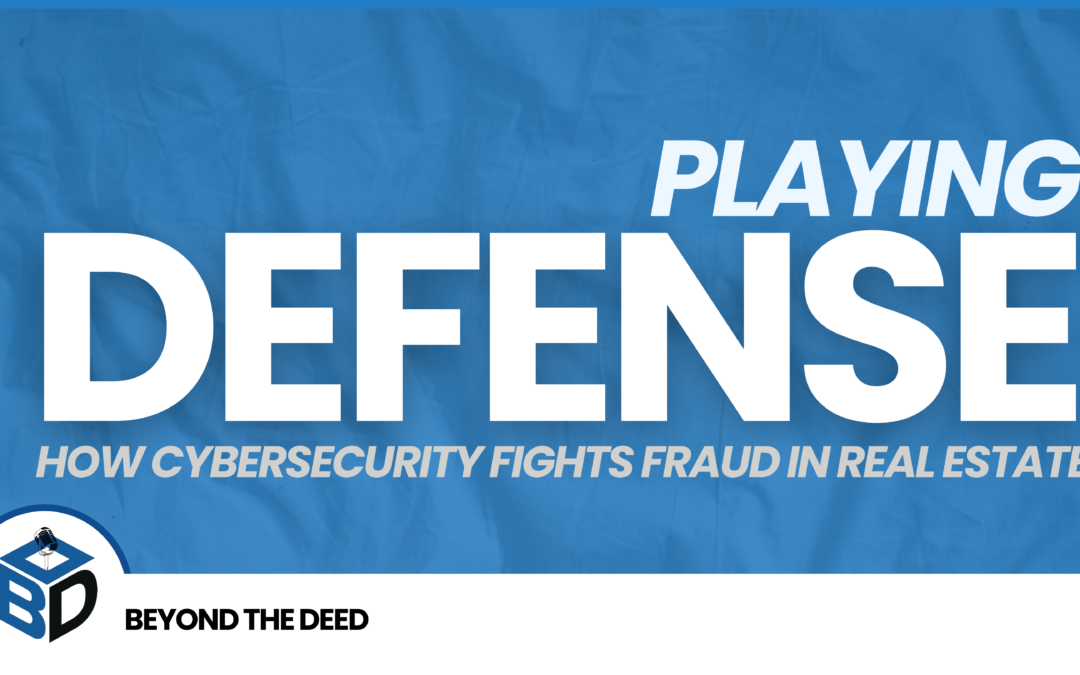Beyond the Deed | Episode 3 Recap
In today’s digital world, the threat of real estate fraud isn’t just real—it’s growing at an alarming rate. Wire fraud, in particular, has ballooned into a billion-dollar problem across the real estate industry, fueled by increasingly sophisticated scams and a lack of cybersecurity awareness. With tens or even hundreds of thousands of dollars at stake in every transaction, cybercriminals are finding creative and deeply harmful ways to intercept and reroute funds. These aren’t petty crimes—they’re well-coordinated attacks, often tied to global networks and powered by the latest technology.
On this episode of Beyond the Deed, Universal Title CEO David Mason is joined by Zach Launey, founder and president of NRVPC—the IT and cybersecurity backbone behind Universal Title. Together, they dive into the unsettling rise in cybercrime targeting real estate transactions and the aggressive, often invisible tactics fraudsters are using today.
Zach outlines how wire fraud scams typically work: an unsuspecting buyer receives fraudulent wiring instructions that appear legitimate, often after a real estate agent’s email account has been compromised. These scams are terrifyingly effective because they exploit moments of excitement and trust—right before settlement, when buyers are most vulnerable and least likely to second-guess a message that looks official.
With deep expertise in digital forensics, fraud prevention, and infrastructure security, Zach walks listeners through:
- The most common forms of wire fraud, including buyer wire interception and seller impersonation
- Why real estate agents and small brokerages are prime targets for hackers
- How AI, deepfakes, and email spoofing are making scams harder to detect and easier to replicate
- The alarming simplicity of compromising an inbox—and how it snowballs into stolen funds
- What the FBI can and can’t do in response to these crimes, and why timing is everything when fraud occurs
One particularly eye-opening portion of the conversation explores how fraud is often driven by organized crime. Zach shares chilling real-world examples of international scam rings targeting U.S. transactions, sometimes even coercing vulnerable individuals into participating. From AI-generated voice models that can mimic a title agent’s tone to spoofed emails with perfect grammar, the tools of deception are evolving fast.
But there is hope—and clear action steps. Zach emphasizes that buyers and agents alike can reduce risk significantly by following a few essential practices. One key tip? Never trust wiring instructions sent by email. At Universal Title, instructions are only delivered through a secure portal—and that protocol never changes. If something looks suspicious, clients are encouraged to call the number on Universal Title’s website directly for verbal verification.
Zach also advises real estate professionals to tighten their email security using tools like multi-factor authentication, conditional access policies, and advanced phishing filters. Shared inboxes, he warns, are especially dangerous. And for those unsure of where to start, applying for cyber insurance can serve as a built-in security audit: the insurer’s checklist helps identify gaps and reinforces best practices across the board.
Looking to the future, Zach and Dave discuss how emerging technologies like AI will further complicate fraud prevention. From voice cloning to impersonation via video, the next generation of scams will likely be harder to spot and more emotionally manipulative. That’s why education is critical—not just for title professionals, but for buyers, sellers, and agents at every level.
Despite the daunting challenges, this episode offers a grounded, practical roadmap for protection. As Zach notes, cybersecurity is a constant battle. The defenders must be successful 100% of the time; the criminals only have to win once.
If you’re involved in real estate in any capacity, this is one conversation you can’t afford to miss. Tune in to understand the risks, protect your clients, and strengthen your digital defenses.



Recent Comments